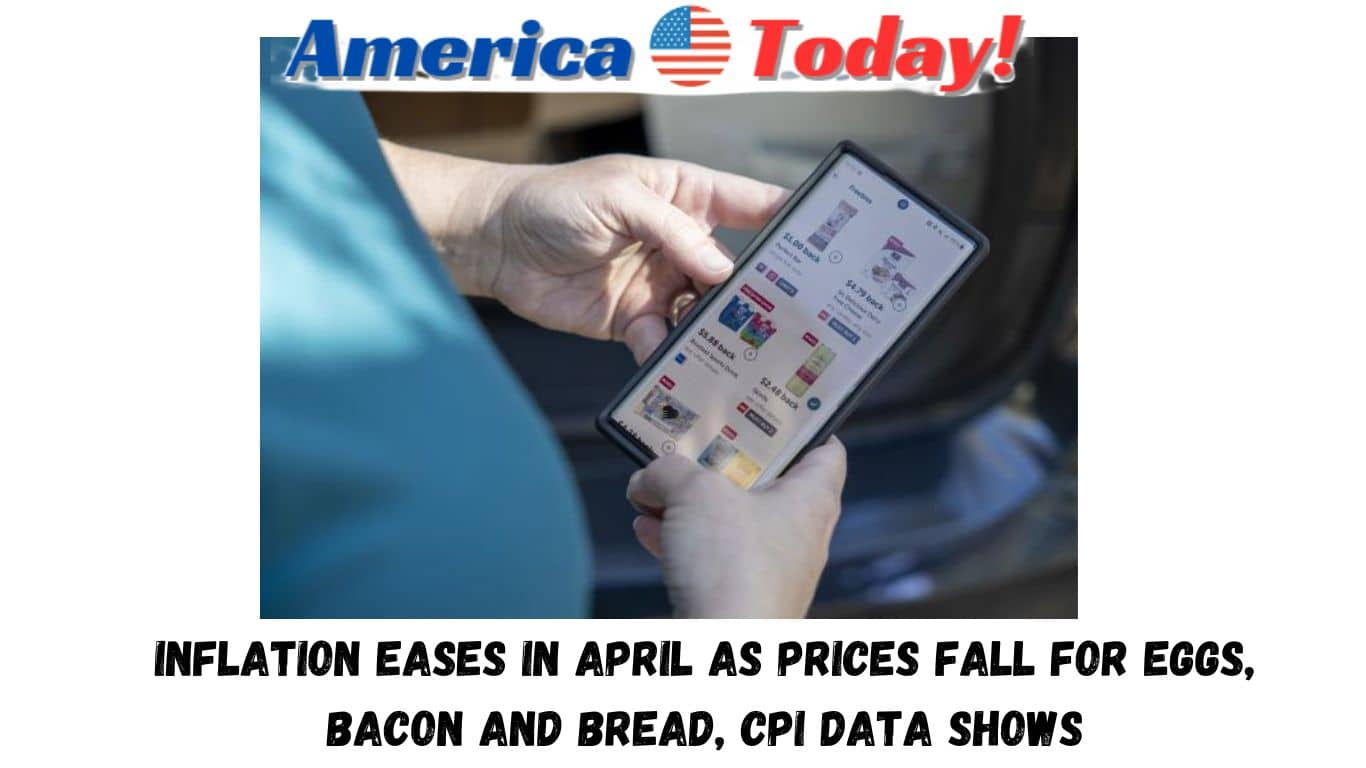welcom to America today with a new article about Inflation eases in April as prices fall for eggs, bacon and bread, CPI data shows
Inflation eased in April as declines in grocery and used car prices offset another rise in rent and gasoline.
After inflation picked up notably early this year, the report revealed more progress in the battle to tame prices, with an underlying inflation measure reaching a three-year low.
Still, it may not be enough to convince the Federal Reserve to cut interest rates in the next couple of months.
“Today’s numbers brought welcome signs of cooling price pressures,” Kayla Bruun, senior economist of research firm Morning Consult wrote in a note to clients.
She added that that monthly inflation is still “Not low enough.” Overall prices increased 3.4% from a year earlier, down from 3.5% in March, according to the Labor Department’s consumer price index, a gauge of goods and services costs throughout the economy.
On a monthly basis, costs rose 0.3%, below the 0.4% rise the previous month but above the 0.1% to 0.2% readings that prevailed last fall.

What is core inflation in the USA right now?
Core prices, which strip out volatile food and energy items and are watched more closely by the Fed, increased 0.3% after three straight 0.4% bumps. That pushed down annual inflation from 3.8% to 3.6%, the lowest since April 2021.
Is inflation expected to go down?
After easing rapidly last year, inflation unexpectedly accelerated in the first quarter but is still down substantially from a 40-year high of 9.1% in June 2022.
As pandemic-related supply chain troubles have resolved, goods such as used cars, furniture and appliances – whose prices soared during the health crisis – have gotten less expensive.
The cost of services such as rent, car insurance and repairs, and recreation have steadily drifted higher.
That’s partly because wage growth is slowing just gradually following pandemic-induced labor shortages.
By December, Barclays expects yearly inflation to slow to 3.1% and the core index measure to fall to 3.3% – still well above the Fed’s 2% goal.
Are interest rates expected to drop?
Wednesday’s report “Keeps alive the prospect of the Fed starting to cut rates in September,” Nationwide Chief Economist Kathy Bostjancic wrote in a note to clients.
Fed rate cuts would lower borrowing costs for mortgages, credit cards and auto and other consumer loans, especially aiding low- and middle-income Americans.
As recently as late March, the Fed was forecasting three rate cuts this year after price increases had slowed dramatically in 2023.
From March 2022 to July 2023, the Fed raised its benchmark short-term rate from near zero to a 23-year high of 5% to 5.25% to subdue inflation.
A third straight month of hot inflation in March 2024 led Fed Chair Jerome Powell and other central bank officials to proclaim that rates will likely stay higher for longer as they await a more sustainable move to the Fed’s 2% target.
Powell repeated that message at a conference in Amsterdam on Tuesday, saying, “We’ll need to be patient and let restrictive policy do its work.” The futures market now foresees the Fed’s first rate cut in September and another in December.
Before the inflation flare-up, it was betting on an initial cut in June and a total of three decreases in 2024.
What is the stock market doing today?
Investors welcomed the modest inflation slowdown that maintained hopes for at least some rate cuts. In midmorning trading Wednesday, the Dow Jones Industrial Average rose 147 points to 39,705 while the S&P 500 index was up 0.55% at 5,275.
Why are US gas prices rising again?
Gasoline prices rose 2.8% in April, the third straight increase after four straight monthly declines. Demand is picking up as the spring driving season gears up and refiners switch to more expensive summer blends.
Will rent go down in 2024 in the USA?
Together, the cost of housing and gas accounted for more than 70% of the monthly increase in overall prices
Rent increased 0.4% in March, the latest in a long string of hikes. That nudged down the annual rise to a still elevated 5.4% from 5.7%. Economists expect rent increases to moderate, based on new leases, but that has rippled just gradually to existing leases.
The cost of some other services also kept moving higher. Auto insurance leaped 1.8% and is up 22.6% in the past year. Medical care increased 0.4%. and personal care services, such as haircuts and laundry jumped 1.1%.
But as the summer travel season draws near, airfares fell 0.8% and hotel rates edged down 0.2%. Car repair costs were flat but still up 7.6% from a year earlier.
Are food prices increasing or decreasing?
Grocery prices dropped 0.2% after flatlining the previous two months, nudging down the annual increase to just 1.1% and giving consumers continued relief from the pandemic’s supply chain snarls and food price run-ups.
The prices farmers received for items such as vegetables, dairy and poultry softened in March, leading to drops in retail prices last month, according to Barclays and the Agriculture Department
Egg prices tumbled 7.3%; bacon fell 0.7%; chicken dropped 0.8; and bread dipped 0.2%.
Other items got a bit more expensive. Breakfast cereal prices rose 3.1%; rice, 0.4%; and uncooked ground beef, 0.3%.
Will the cost of goods come down?
Goods prices continued to slide as pandemic-related supply snags and demand surges faded. Used car prices declined by 1.4; furniture, by 0.5%; and appliances, by 0.9%.
